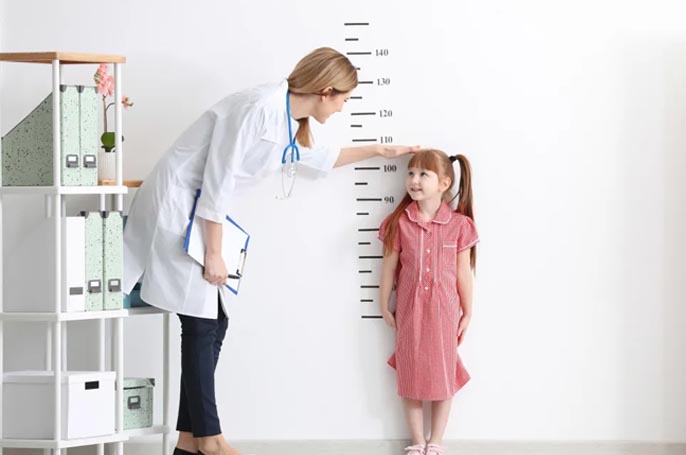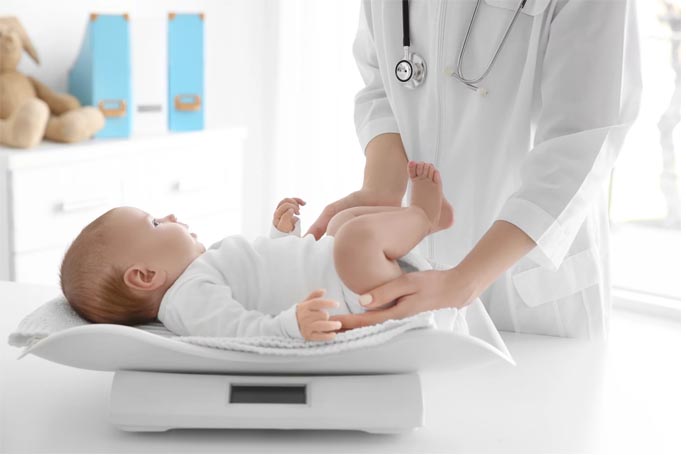Growth Clinic

Understanding your child’s changing and emerging growth and development is an important part of parenting. As infants and children progress through a series of growth stages, they may encounter physical and emotional challenges, and some relatively common problems during these years.
Growth and development includes not only the physical changes that will occur from infancy to adolescence, but also some of the changes in emotions, personality, behavior, thinking and speech that children develop as they begin to understand and interact with the world around them.
How does a child grow and develop between the ages of 2 and 5?
The ages between 2 and 5 are often called the preschool years. During these years, children change from clumsy toddlers into lively explorers of their world. A child develops in these main areas:
- Physical development. In these years, a child becomes stronger and starts to look longer and leaner.
- Cognitive development. A child this age makes great strides in being able to think and reason. In these years, children learn their letters, counting, and colors.
- Emotional and social development. Between the ages of 2 and 5, children gradually learn how to manage their feelings. By age 5, friends become important.
- Language. By age 2, most children can say at least 50 words. By age 5, a child may know thousands of words and be able to carry on conversations and tell stories.
- Sensory and motor development. By age 2, most children can walk up stairs one at a time, kick a ball, and draw simple strokes with a pencil. By age 5, most can dress and undress themselves and write some lowercase and capital letters.
Each child grows and gains skills at his or her own pace. It is common for a child to be ahead in one area, such as language, but a little behind in another.
Learning what is normal for children this age can help you spot problems early or feel better about how your child is doing.
Evaluation Services
In Child Growth Clinic, staff conduct individualized assessments to identify a child’s strengths in various areas of functioning as well as possible factors contributing to a child’s difficulty. Our assessments can help families better manage a child’s developmental/behavioral challenges by making recommendations designed to build upon a child’s strengths, such as appropriate educational settings and goals.
In Child Growth Clinic, evaluations are conducted in the following areas:
- Activity or behaviour problems, including extreme irritability, temper tantrums, hyperactivity or aggression
- Developmental delays in walking, talking or social interactions
- Developmental or behavioural risk factors, including premature birth and chronic medical disease
- Family difficulties in understanding and/or managing child developmental delays/behavioural problems
- Specific developmental disabilities such as autism, attention deficit/hyperactivity disorder and mental retardation
- Sleeping difficulties, enuresis (bed-wetting), encopresis (soiling) or other problems with bodily functions and psychological well-being
How can help increase my baby’s development and emotional security?
Young babies need the security of a parent’s arms, and they understand the reassurance and comfort of your voice, tone and emotions. Consider the following as ways to foster the emotional security of your newborn:
- Hold your baby face to face.
- Talk in a soothing tone and let your baby hear your affectionate and friendly voice.
- Sing to your baby.
- Walk with your baby in a sling, carrier or a stroller.
- Swaddle your baby in a soft blanket to help him or her feel secure and prevent startling by the baby’s own movements.
- Rock your baby in a rhythmic, gentle motion.
- Respond quickly to your baby’s cries.
If you are concerned about your child’s growth and development, please contact our Pediatrician & Neonatologist Dr. Aakshi D. Sachar.


